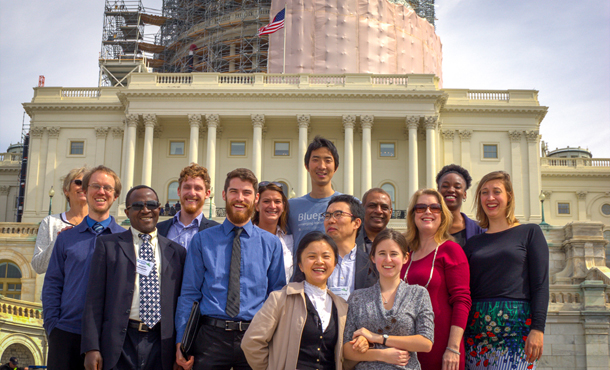If true peace is to be achieved, peacebuilders must step beyond theory and into tangible arenas of injustice or conflict. That belief is why Eastern Mennonite University’s Center for Justice and Peacebuilding graduate program offers both short- and long-term practice opportunities for students. One recent opportunity was attendance at a three-day lobbying weekend sponsored by the Friends Committee on National Legislation (FCNL) in Washington D.C. This year’s theme was climate change.
“The annual spring lobby weekend engages young people in issues around peace,” says CJP practicum coordinator Amy Knorr. This year’s conference was divided into three sessions: faith-based activism, the issue of climate change, and techniques for effective lobbying.
All graduate students in the conflict transformation program were invited to attend and 17 made the trip, joining nearly 300 other participants from around the country.
“I was primarily interested in going because of the lobbying focus,” said Dina Rubey. “I wanted to gain some practical lobbying skills and experience.”
One tip that the group learned in addressing the issue of climate change was to change the language.
“Talking about climate change is a no-no because half of Congress reels back from those words. So we learned to talk about ‘climate disruption’ instead,” says Knorr.
FCNL organizers teaching lobbying skills suggested focusing instead on climate change as an issue with policy implications: what has been done in Congress and what has not been done and “getting Congress to agree that there are extreme weather patterns across the world,” Knorr says.
Rubey says she also learned that effective lobbying needs to be direct and clear. “Caring about an issue is not the same as having something very specific you want your representative to do,” she says. “Advocating for the issue alone may not get the change to occur. You need to pick a very specific action you’d like your representative to take and tell them what that action is. Lobbyists are in long-term relationships with representatives.” Rubey emphasized that lobbying is not a one-time strategy.
In the afternoon of the third day, the students met with the senior chief legislative officer for Congressman Bob Goodlatte, a Republican whose district covers much of the Shenandoah Valley.
That was the most meaningful part of the weekend for Mikhala Lantz-Simmons. This past fall, she worked on a semester-long conflict analysis project about hydraulic fracturing in Bergton, Virginia. Goodlatte, who supports hydraulic fracturing, is a stakeholder in the issue and she says it was interesting to hear some clarification from his office about his stance.
The students also met with a representative of Senator Mark Warner, a Democrat respresenting Virginia. Knorr says this was an entirely different experience because unlike Goodlatte, Warner is supportive of legislation that calls for bipartisan congressional action to acknowledge the science and reality of climate change.
In the end, “we really want to see how our students can engage on a local level,” says Knorr. “A lot of our students are interested in global peacebuilding, but this is a really good way for us to engage locally and nationally as well.”

great article! thanks!